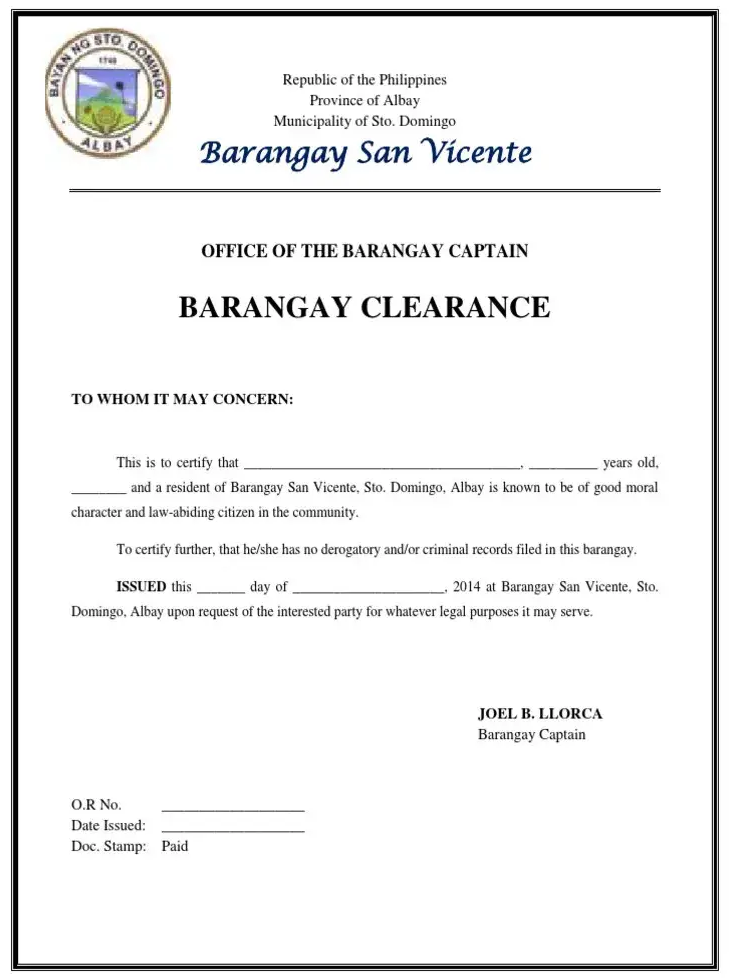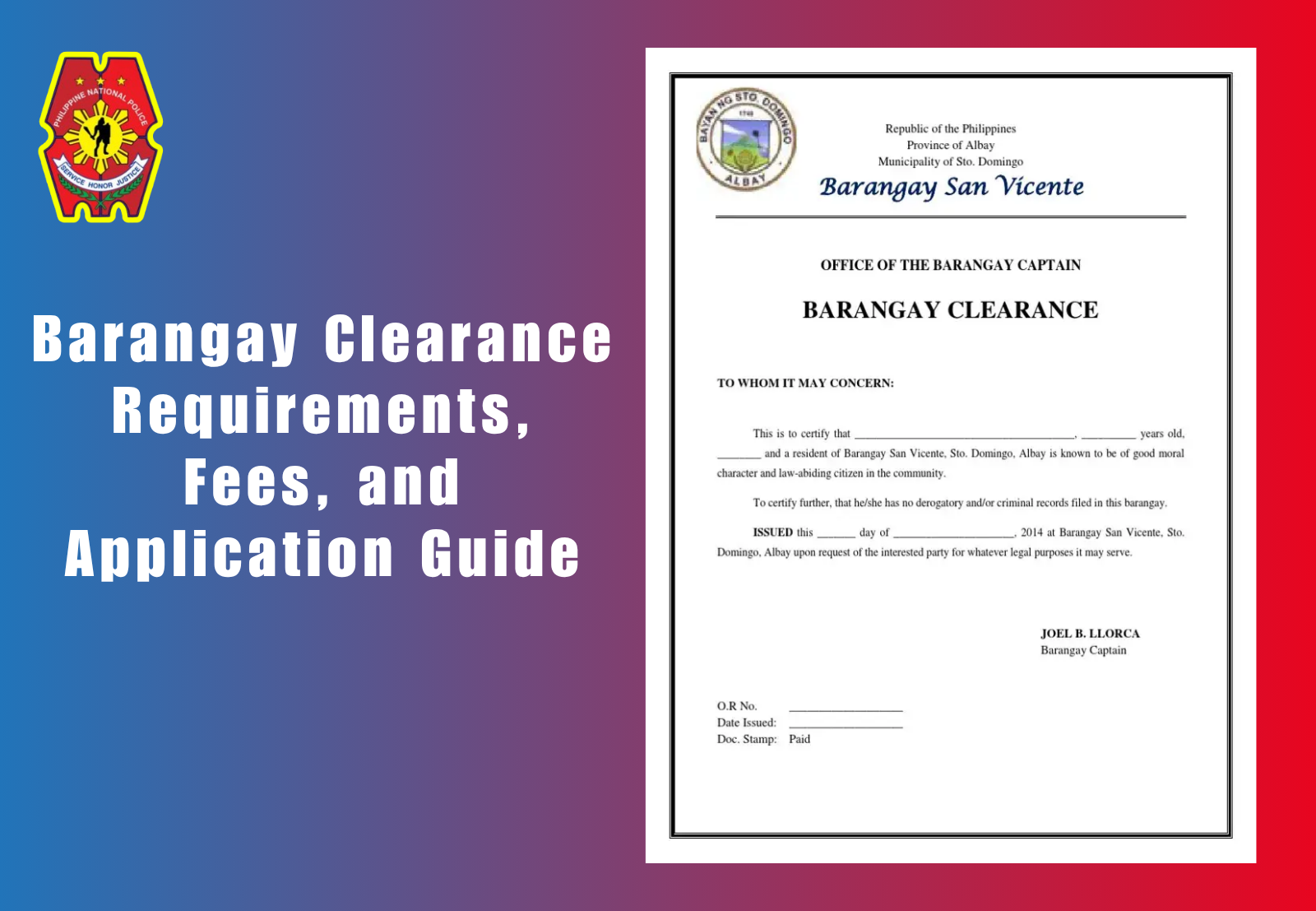A barangay clearance is one of the most common documents you may need in the Philippines. Whether you’re applying for a job, starting a business, or processing other government papers, this document proves that you are a resident of your barangay and have a good record in your community.
Many people are not sure what it is for, what documents are required, or how to get it without delays. In this guide, we will explain what a barangay clearance is, its uses, requirements, fees, and the step-by-step process to get one both in person and online.
What is a Barangay Clearance?
A barangay clearance is an official document issued by your barangay. It confirms that you live in the community, are in good standing, and have no record of trouble or pending cases within the barangay. It is signed by the barangay captain and stamped with the barangay seal to make it valid.
Many people confuse a barangay clearance with a barangay certificate. While both come from the barangay office, they are not exactly the same.
- Barangay Clearance certifies both your residency and your good moral character. It is often required for job applications, business permits, and other official purposes.
- Barangay Certificate simply states that you are a resident of the barangay. It does not confirm your conduct or legal standing.
The legal authority for issuing a barangay clearance comes from the Local Government Code of 1991 (Republic Act No. 7160), which gives barangays the power to provide certifications and permits. Under Republic Act No. 11261, first-time job seekers can get a barangay clearance for free, along with certain other documents, as part of government support for employment.

Purposes of Barangay Clearance
A barangay clearance is more than just a piece of paper. It serves many official and legal purposes. Here are the most common situations where you might need one:
1. Job applications
Many private companies and government offices require a barangay clearance before hiring. It proves that you are a resident with good moral character and no pending cases in your barangay.
2. Applying for Police or NBI Clearance
A barangay clearance is often the first step before you can get a police clearance or NBI clearance. It acts as a local background check to confirm you have no issues in your community.
3. Business permits
If you want to start or renew a business, you will need a barangay business clearance. This document confirms that your business complies with local regulations and has the barangay’s approval.
If you’re also planning to register your business, check our guide on getting a DTI Certificate of Registration.
4. Loan and banking requirements
Some banks, lending companies, and cooperatives ask for a barangay clearance when you apply for a loan or open an account. It helps them confirm your identity and assess your trustworthiness.
5. Passport or travel documents
A barangay clearance may be requested to verify your residency and character before you are granted travel-related documents. This is especially useful for first-time applicants.
6. Marriage license
Local civil registrars may ask for a barangay clearance for both partners before issuing a marriage license. It ensures that there are no legal problems or disputes in your barangay.
7. Construction permits
If you are building or renovating a property, a barangay clearance is often needed. It confirms that your project meets local safety rules and has no objections from the barangay.
8. Vehicle registration
Some local offices ask for a barangay clearance when registering a vehicle. It helps confirm your address and adds an extra layer of identity verification.
Barangay Clearance Requirements 2026
Before applying, make sure you have all the needed documents to avoid delays. The Barangay Clearance Requirements may vary slightly depending on your location, but most barangays follow a similar list.
1. Government-issued valid ID
This could be a driver’s license, passport, UMID, PhilHealth ID, or any other valid government ID to confirm your identity.
2. Proof of residency
A utility bill, lease contract, or certification from your homeowner’s association that clearly shows your name and address.
3. Community Tax Certificate (Cedula)
Often required before you can apply. You can usually get this at the municipal or city hall.
4. Filled-out application form
This form is available at the barangay hall and must be completed with accurate information.
5. Barangay Clearance fee
The fee varies by purpose, but it is generally affordable. Keep the receipt as proof of payment.
6. Additional requirements for special purposes
For example, if you’re applying for a barangay business clearance, you might need to present business registration documents.
To save time, it’s best to check your barangay’s official page or contact their office for the most updated Barangay Clearance Requirements before visiting. This ensures you bring everything needed in one trip.
How Much is Barangay Clearance?
The fee for a barangay clearance is generally affordable. In most barangays, the cost ranges from ₱20 to ₱200, depending on where you live and the purpose of the clearance.
The price can change based on a few factors:
- Purpose – A clearance for personal use may cost less, while a barangay business clearance can be slightly higher because it’s tied to business permits.
- Location – Fees vary per barangay. Urban barangays may have slightly higher rates compared to rural areas.
Under Republic Act No. 11261 or the First Time Jobseekers Assistance Act, first-time job seekers can get a barangay clearance for free, along with other documents like police clearance and NBI clearances.
Aside from the barangay clearance fee, you may also need to pay for a Community Tax Certificate (Cedula). The cedula cost depends on your income from the previous year and other factors set by your local government.
Barangay Clearance Validity
A barangay clearance is generally valid for one year from the date it was issued. This is the standard validity followed by most barangays in the Philippines.
However, some offices and institutions accept only recent clearances, usually issued within the last three to six months. This is common for job applications, business permits, and certain government transactions.
To check the expiry, look at the date of issue printed on your barangay clearance. If you are unsure, you can confirm with the office where you will submit it, as they may have their own rules on document validity.
Step-by-Step Guide: How to Get Barangay Clearance (In Person)
Getting a barangay clearance is a straightforward process if you prepare your documents in advance. Follow these steps:
1. Visit your Barangay Hall during office hours
Go to your barangay hall early to avoid long lines. Make sure you bring all the required documents.
2. Request and fill out the application form
Ask the barangay staff for a clearance application form. Fill it out completely with accurate information.
3. Submit requirements
Hand over the form along with your valid ID, proof of residency, cedula, and any other needed documents.
4. Pay the clearance fee
Proceed to the cashier or treasurer’s office to pay the barangay clearance fee. Keep the receipt as proof of payment.
5. Wait for processing
Processing time can be as fast as the same day, but in some cases, it may take a few days depending on the barangay’s workload.
6. Receive and sign the logbook
Once your clearance is ready, you will be asked to sign the barangay logbook before they hand over the document to you.
How to Get Barangay Clearance Online
Not all barangays offer online services, so the first step is to check if your barangay allows online application. You can visit their official website or Facebook page to confirm.
If online application is available, the usual steps are:
1. Fill out the online form
Provide complete and accurate personal details as required in the form.
2. Upload the required documents
This may include a valid ID, proof of residency, and a cedula. Make sure the scanned copies or photos are clear and readable.
3. Pay the clearance fee online
Accepted methods may include GCash, PayMaya, or online banking, depending on your barangay’s setup.
4. Claim your clearance or wait for delivery
Some barangays let you pick it up at the hall, while others offer delivery within the area.
Important: Always use official government websites or verified barangay social media pages when applying online. This helps you avoid scams and ensures your personal information is secure.
What’s Inside a Barangay Clearance Document
1. Barangay name & seal
The official name of the barangay, along with the city or municipality, is printed at the top. The barangay seal is added to confirm authenticity.
2. Applicant’s personal info
Includes your full name, address, and other identifying details such as age or civil status.
3. Certification statement
A short statement from the barangay confirming that you are a resident in good standing with no pending cases or disputes.
4. Barangay Chairman’s signature & seal
The signature of the barangay captain or chairman, together with the official dry seal or stamp, makes the document valid.
5. Date issued & validity
Shows when the clearance was issued. Some offices may also indicate the expiry date or note the standard validity period.
Tips for a Smooth Application
A few simple practices can help you get your barangay clearance without stress:
Prepare all documents before visiting
Bring your valid ID, proof of residency, cedula, and any other needed papers so you won’t have to come back.
Be honest in your application
Give accurate details. False information can lead to delays, rejection, or even legal issues.
Avoid fixers
Only deal with official barangay staff. Fixers may overcharge you and give you fake documents.
Respect processing times
Some barangays process clearances on the same day, others may take a few days. Be patient and follow up politely if needed.
Conclusion
A Barangay Clearance is one of the most important documents you can get from your local barangay. It proves your residency, good moral character, and a clean record in the community, making it a requirement for many transactions, such as job applications, permits, and loans.
To save time and avoid delays, always check your barangay’s process and prepare all requirements before visiting. Whether you’re applying for personal, employment, or business purposes, having your barangay clearance ready ensures smoother transactions wherever it’s needed.
FAQs
1. Is Barangay Certificate and Barangay Clearance the same?
A Barangay Certificate confirms residency only, while a Barangay Clearance verifies both residency and good moral character. The clearance is more detailed and is required for official transactions like job applications, business permits, and loan processing.
2. How to get a Barangay ID?
Visit your barangay hall and ask if they issue Barangay IDs. Fill out the application form, present a valid ID or birth certificate, and submit a recent photo. Some barangays provide it for free, while others charge a small fee.
3. What are the Barangay Clearance Requirements for employment?
For employment, the usual requirements are: a valid government-issued ID, proof of residency, a cedula, a filled-out application form, and the clearance fee. Some employers may also request a barangay business clearance if you are self-employed or running a small business.
4. What is a Barangay Business Clearance sample?
A Barangay Business Clearance sample typically includes the business name, owner’s details, business address, purpose of clearance, date issued, and the signature of the barangay captain with the barangay seal. It confirms your business complies with local regulations.
5. Can I get Barangay Clearance without a Cedula?
In most cases, no. A cedula is a standard requirement for barangay clearance. However, some barangays may allow you to get the cedula first at the municipal or city hall during the same visit.

